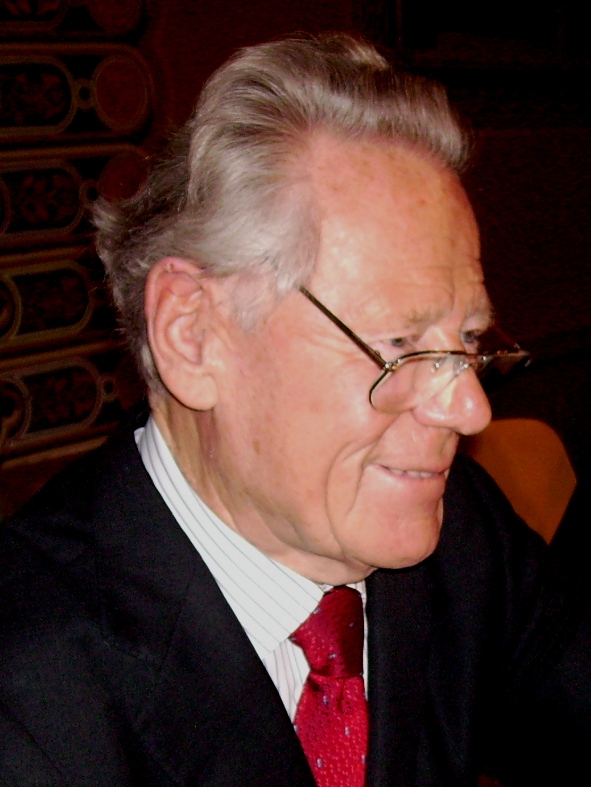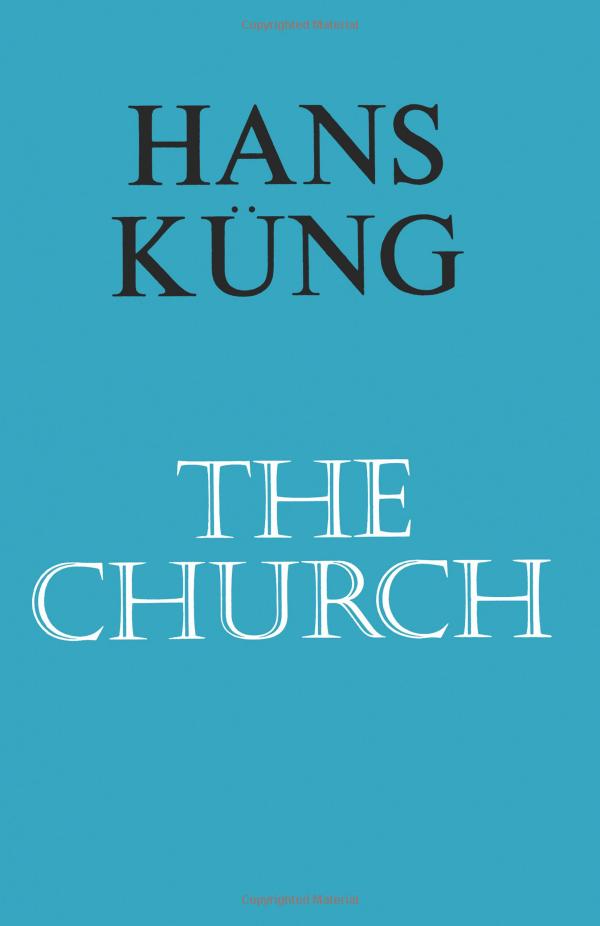 Hans Küng is a Catholic Priest and a prolific theologian, and a very controversial man. I'm drawn to his writings because he serves as aurea mediocritas between Protestantism and Catholicism. I first learned about Küng after his criticism of the Roman Church's handling of the child abuse cases throughout Europe. If I remember correctly, he believed that the Church's prohibition of marriages for the priests was a cause of the sex scandals, and Küng called for not only the abolition of celibacy but he also desired a very liberal change in the churches views of women and other modern questions. Küng was recently in the news over Pope Benedict XVI's visit to Germany, and was interviewed by many news sources such as this article in the New York Times.
Hans Küng is a Catholic Priest and a prolific theologian, and a very controversial man. I'm drawn to his writings because he serves as aurea mediocritas between Protestantism and Catholicism. I first learned about Küng after his criticism of the Roman Church's handling of the child abuse cases throughout Europe. If I remember correctly, he believed that the Church's prohibition of marriages for the priests was a cause of the sex scandals, and Küng called for not only the abolition of celibacy but he also desired a very liberal change in the churches views of women and other modern questions. Küng was recently in the news over Pope Benedict XVI's visit to Germany, and was interviewed by many news sources such as this article in the New York Times.
Küng is a middle man because of the influence of Karl Barth. Justification was Hans Küng's doctoral thesis, and consisted of a very uncatholic view of Justification based almost identically with Karl Barth's volume on Reconciliation in Barth's Church Dogmatics. Küng's Justification even includes a A Letter To The Author by Karl Barth that asks Küng whether he arrived on his theory of Justification before or after reading his Church Dogmatics. As a committed Reformed Christian, I would firmly answer Kevin DeYoung's quoted question "Barth or Calvin" with a firm "Calvin!", however, I do believe that unity in the church, among an age of a protestant church that has split into a myriad of shards, that we should reconsider how we answer Machen's affirmation of "truth before friendship" with much less insurgency. So, what I'm saying is that I like that Küng is a middle ground, however, its a ground from no-where for me, because I am not Barthian, but still sympathetic.
Küng's hope of reform of the Catholic Church has not be well received (if received at all). Not too long ago, Küng wrote a letter addressing all 5,000(?) bishops in the Catholic Church calling for a reform, but Küng lamented that none of them were willing to make a stand against the Papacy. (It's a high price to pay after all.) This was a direct answer to the question raised by Barth in the preface to Justification, because Barth said that even if you do believe this, which I agree with, you're church does not follow you (my paraphrase). And so they haven't, and to the extreme of censoring Küng, with a papal order that he is no longer able to teach theology within the church at all, yet as an act of grace, Küng is still in otherwise good standing in the church. And most recently, Pope Benedict XVI has requested an audience from Küng, so talk is not silenced.
 What actually caused me to pick up one of Küng's book was not the news but rather Edmund P. Clowney's book on "The Church"; which I will say is a most excellent book and at the top of my list for books on ecclesiology. Clowney is a man I read humbly, at his feet, and not critically like Küng's book which he engages throughout.
What actually caused me to pick up one of Küng's book was not the news but rather Edmund P. Clowney's book on "The Church"; which I will say is a most excellent book and at the top of my list for books on ecclesiology. Clowney is a man I read humbly, at his feet, and not critically like Küng's book which he engages throughout.
Küng's book The Church, is a large volume -- well over 600 pages. And it reads very much as if it were written by a Protestant, but a Protestant who recognizes a need for a papal office for the sake of unifying the church, not as an infallible christ-like substitute. Küng is not only influenced by Barth, but also approves of all the critical and marginalizing ideas of liberal protestant theology. For instance, Bultmann is quoted often, for the point of demythologizing the view of the Church, and modern science easily is given authority over scripture, and form criticism is a major method of Küng.
However, Küng's use of modern ideas is rather productive, rather than in hatred (as in the case of Hermann Samuel Reimarus or David Strauss). The best example is his polemic for the three-tiered Catholic Ecclessiology; Küng believes that the Pastorals are written late and not by Paul, however they may be derived from Paul's teachings, and Küng constantly contrasts "Paul" verse "Acts and the Pastorals". I believe in Pauline authorship of the Pastorals, but its true that the vocabulary and style of those Pastorals are significantly different than the rest of Paul, in a way that a more developed later thought may be recorded. (viz. It's an irresistible temptation in an age of form and higher criticism for theologians jump to mythos or deny authorship at the first suggestion of variety between letters.) So Küng's argument advances from a primitive disorganized church in the Byzantine East, to a more established church of the pastorals in the Latin West, then into the three-tiered bishop-elder-deacon model of the Early Church Fathers especially Ignatius. Most conservative Reformed Christians see a two-tiered elder-deacon leadership model in the New Testament, and yet there is a clear three-tiered bishop-elder-deacon role in Ignatius, which Kung identies with the Clergy-Laity-People's model of the current Catholic Church. It is a very good and clever argument, that appears convincing.
Küng's argument for the Papal office is excellent too, for he was censored for criticizing Papal Infallibility as a late added fiction, yet still sees the need of a unifying office. He even hopes to see the Orthodox and the Anglicans reunited someday under the Papal office, and only seeing the Papal office as a final appeals court rather than the pastor of the Church. It's a very hopeful ideal, and I wish to someday see a unified Church again, and not one like Küng's description of the Inquisition where the "blackest pages of the Church's History were written" (paraphrase). Again, it is Küng's modernistic sympathy that causes him to reject Papal Infallibility, and I would group in conservative dogmas such as historical Adam.
A last anecdote from the book is Küng' insistence on the Church as a "priesthood of all believers" and in one instance he discusses whether a lay man may teach theology, and in the most extreme and isolated happenstance, where there is no church or structure in a remote land, is any lay Christian able to gather together other Christians and practice the Baptism and Lord's Supper. Would this be a valid Church, especially if the Church were to later return to the region and insist that the laymen cease. It's a wonderful section that validates and simultaneously casts doubts on the question "Whether just anyone may throw up a Church sign and open a church at anytime?"
Overall, it was another compelling and captivating book, and an excellent read for any Protestant who would like to seek middle ground with Catholics and Orthodox. It's a long book, that I loved, and one I cannot fairly review without making this into a book of its own.
Related: Edmund P. Clowney, Hans Küng, Justification, Karl Barth, Pope Benedict XVI, Roman Catholicism, The Church



Leave a comment